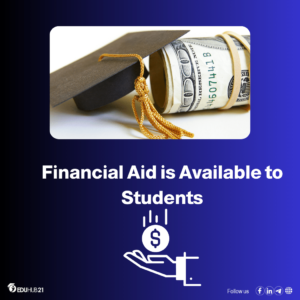financial Financial Aid is Available to Students aid provides a glimmer of hope by offering financial assistance to those in need. In this article, we will explore the various types of financial aid available to students, the application process, eligibility criteria, and the impact of financial aid on students’ lives.

Financial Aid is Available to Students
Are you a student ready to embark on your educational journey? Are you concerned about the expenses that may not be fully covered by traditional financial aid and scholarships? We understand the importance of supporting students in their pursuit of education, and that's why we are thrilled to offer the 2023 ServiceScape Scholarship. This scholarship, valued at $1,000.00 USD, is designed to assist students like you in covering various educational expenses, from books to supplies and more. To apply for this exciting opportunity, all you need to do is share your thoughts on the topic: "How does writing impact today's world?" in a 300-word essay. Let your ideas flow and make a difference through your writing.
You will find all information about this program below
Importance of Financial Aid for Students
Financial aid plays a vital role in ensuring that students from diverse backgrounds have access to quality education. It levels the playing field, allowing students with limited financial resources to pursue their academic dreams without being overwhelmed by the burden of expenses.
Types of Financial Aid
Grants
Grants are a form of financial aid that does not require repayment. They are typically need-based and are offered by the government, educational institutions, or private organizations. Grants can significantly reduce the financial burden on students and their families.
Scholarships
Scholarships are merit-based awards given to students based on their academic achievements, talents, or other criteria. They can be provided by universities, corporations, foundations, or community organizations. Scholarships are highly coveted as they do not have to be repaid.
Loans
Student loans are a common type of financial aid that students can borrow to cover their educational expenses. Unlike grants and scholarships, loans must be repaid with interest, usually after the student graduates.
Work-Study Programs
Work-study programs offer students part-time employment opportunities on campus or with approved off-campus employers. It allows students to earn money while studying, helping them cover their educational costs.
Applying for Financial Aid
The process of applying for financial aid can be daunting, but it is essential to access the funds necessary for education. Here are the primary avenues for applying:
FAFSA (Free Application for Federal Student Aid)
The FAFSA is a standardized form used to determine a student's eligibility for federal financial aid programs, including grants, loans, and work-study opportunities. It collects information about the student's family income, assets, and other factors to assess their financial need.
CSS Profile (College Scholarship Service Profile)
The CSS Profile is an additional application required by some private colleges and universities to distribute their institutional financial aid. It provides a more comprehensive view of the student's financial situation compared to the FAFSA.
Institutional Aid Applications
Many colleges and universities have their own aid applications, which may require additional documentation. It's crucial for students to check the requirements of each institution they are applying to and ensure they meet all deadlines.
Eligibility Criteria
Financial aid eligibility can be based on two primary factors:
Need-Based Financial Aid
Need-based financial aid is determined by the student's and their family's financial circumstances. It is awarded to students who demonstrate a financial need for assistance based on their FAFSA or CSS Profile.
Merit-Based Financial Aid
Merit-based financial aid is awarded to students based on their exceptional academic achievements, talents, leadership qualities, or other accomplishments.
Tips for Maximizing Financial Aid
To make the most of available financial aid opportunities, students should consider the following tips:
Researching Available Options
It's essential to explore all potential sources of financial aid, including grants, scholarships, and loans. Conduct thorough research to find the most suitable options.
Meeting Deadlines
Many financial aid programs have strict deadlines. Missing these deadlines could result in missing out on valuable aid opportunities.
Providing Accurate Information
Ensure that all information provided in the financial aid applications is accurate and up-to-date. Inaccurate information may lead to delays or even rejection of aid.
Appealing for More Aid
If a student's financial situation changes significantly after applying for aid, they can appeal to the financial aid office for a reassessment.
Common Myths about Financial Aid
Several misconceptions surround financial aid:
Financial Aid is Only for Low-Income Families
While need-based aid is targeted towards low-income families, there are many merit-based scholarships and grants available to students from various economic backgrounds.
Only High Achievers Get Scholarships
Scholarships are not solely reserved for top academic performers. Many scholarships consider various criteria, such as leadership, community involvement, and unique talents.
Applying for Aid is Complicated
While the financial aid application process can be intricate, seeking guidance from school counselors or financial aid officers can simplify it.
Impact of Financial Aid on Students
Financial aid has a profound impact on students' lives:
Increased Access to Higher Education
Financial aid opens doors to higher education for students who may not have otherwise been able to afford it.
Reduced Student Loan Debt
By providing grants and scholarships, financial aid helps students minimize their reliance on student loans, reducing the burden of debt after graduation.
Improved Graduation Rates
Students who receive financial aid are more likely to complete their degree programs due to reduced financial stress.
Government vs. Private Financial Aid
Government financial aid is typically more accessible and has broader eligibility criteria. Private financial aid may be more specialized and targeted to specific student populations.
Financial Aid Scams and How to Avoid Them
Unfortunately, some individuals take advantage of students seeking financial aid. Students should be cautious of scams and never pay for scholarships or financial aid application services.
The Future of Financial Aid
As the landscape of education evolves, financial aid programs will likely continue to adapt to meet the changing needs of students and families.
Details about Financial Aid is Available to Students
Type: Financial Support
Location: Open to applicants from any recognized university.
Majors: All disciplines
Countries: Egypt, United Arab Emirates, Bahrain, Djibouti, Algeria, Iraq, Jordan, Comoros, Kuwait, Lebanon, Libya, Morocco, Mauritania, Oman, Palestine, Qatar, Saudi Arabia, Sudan, Somalia, Syria, Tunisia, Yemen, and all countries worldwide.
Win $1000.
- The contest is open to students attending or planning to attend an accredited college, university, or trade school in 2023.
- Applicants must successfully submit the application form and be at least 18 years old.
- ServiceScape is not liable for submission failures due to technical malfunctions.
- ServiceScape employees and their immediate family members are not eligible to participate.
- No purchase is necessary to enter. Void where prohibited by law.
- Each participant can enter only once.
- Application form submissions must be written in English.
The online application
You will find apply link below
